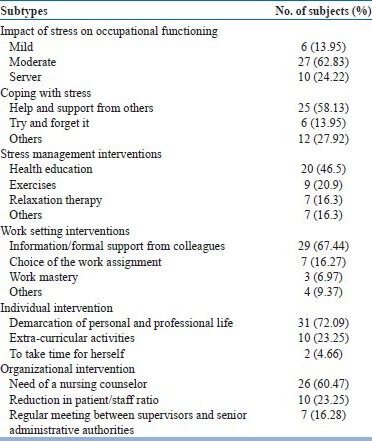Sir,
It is commonly accepted that certain professions, by their very nature, place personnel at risk of experiencing stressful incidents. Recognition is growing that health care professionals, especially emergency unit staffs are at risk for experiencing stressful events.[1] Patient's suffering and death, uncooperative behavior of the patient, unreasonable demands, conflict with administration and lack of emotional support from team members were seen as potential stressors.[2] Some pilot studies have been conducted in developed countries among staff nurses, working under different stressful situations in hospitals.[1,2,3,4]
To the best of the knowledge of the author of the present study, no prior study focusing on this health problem either from general or teaching hospital has been reported from India. The studies conducted in foreign countries may not be relevant to Indian setting. Hence, it was considered important to study this problem in India. A cross-sectional design was followed and a one-time assessment of sociodemographic and measurement of stress levels of in staff nurses working in emergency services of a teaching institution was conducted. It was the descriptive, non-experimental studies in which staff nurses have been interviewed observed and were administered research tools for assessing the stress levels.
Staff nurses posted in emergency department constituted 12.9% (n=52) of total staff nurses strength of the hospital. Most of them were in the age group of 26-30 years (n=30; 69.76%). On self-estimation scale 65.11% (n=28) of staff nurses had moderate levels of stress. 20.93% (n=9) of staff nurses has severe level of stress. On perceived stress scale,[5] 68.2% (n=29) staff nurses has a moderate level of stress and 12.8% (n=5) has mild level and 19.1% (n=8) has a severe level of stress scores in staff nurses 62.83% (n=27) of the staff nurses reported that their occupational functioning was moderately affected due to stress levels.
During the study, 58.13% (n=25) of the study population revealed that they would take help and support from others in coping with stressful situations; 13.95% (n=6) of total sample reported that they will try to forget the stressful events. Need of health education (n=20; 46.5%), exercises (n=9; 20.9%), relaxation therapy (n=7; 16.2%) were reported; 72.09% (n=31) of the staff nurses reported that they would prefer demarcation of personal and professional life; 23.25% (n=10) reported that they will try to reduce stress by participating in extracurricular activities; 60.47% (n=26) of the staff nurses revealed a need for nursing counselor [Table 1].
Table 1.
Stress levels impact and its management

The result of this study showed that work-related stress is common among emergency nursing staff. In the Emergency Department of a Hospital, the staff nurses are overburdened. Staff nurses were most of the time busy in doing non-nursing activities, which increased their stress levels. Stress management program for the staff nurses working in the emergency services is the need of the hour in our country. The high job-related stress levels suggest possible future work in this significant area for the benefit of patient care in emergency unit of a hospital.
ACKNOWLEDGMENT
The authors acknowledge the help and guidance given while preparing this manuscript by the following: Col. Jaydeb Biswas ex Army officer at Command Hospital, Chandimandir, Panchkula. Project submitted for the fulfilment of PGDHHM (post graduate diploma in Hospital and Health Management) by the Indira Gandhi National Open University, New Delhi.
REFERENCES
- 1.Gillespie M, Melby V. Burnout among nursing staff in accident and emergency and acute medicine: A comparative study. J Clin Nurs. 2003;12:842–51. doi: 10.1046/j.1365-2702.2003.00802.x. [DOI] [PubMed] [Google Scholar]
- 2.Payne N. Occupational stressors and coping as determinants of burnout in female hospice nurses. J Adv Nurs. 2001;33:396–405. doi: 10.1046/j.1365-2648.2001.01677.x. [DOI] [PubMed] [Google Scholar]
- 3.Quattrin R, Zanini A, Nascig E, Annunziata M, Calligaris L, Brusaferro S. Level of burnout among nurses working in oncology in an Italian region. Oncol Nurs Forum. 2006;33:815–20. doi: 10.1188/06.ONF.815-820. [DOI] [PubMed] [Google Scholar]
- 4.Jenkins R, Elliott P. Stressors, burnout and social support: Nurses in acute mental health settings. J Adv Nurs. 2004;48:622–31. doi: 10.1111/j.1365-2648.2004.03240.x. [DOI] [PubMed] [Google Scholar]
- 5.Cohen S, Kamarck T, Mermelstein R. A global measure of perceived stress. J Health Soc Behav. 1983;24:385–96. [PubMed] [Google Scholar]


